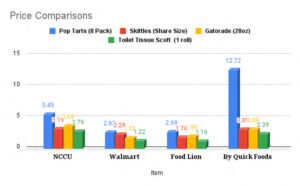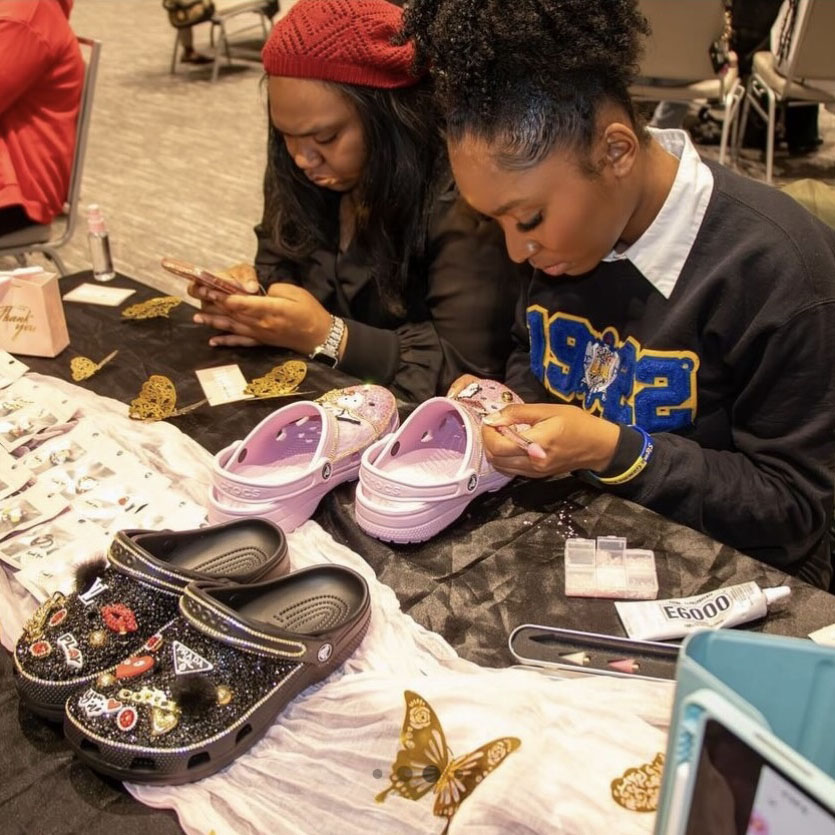When I went to buy a few items from N.C. Central University’s convenience stores, some of the prices felt too high.
I wanted to buy a pint of Ben and Jerry’s ice cream but saw that it was $6.99. When I compared that price to the same item at Food Lion, I found that NCCU’s was two dollars more.
The difference made me curious about how NCCU fared against other stores, so I began to compare their prices of Skittles, Poptarts, Gatorade, and toilet tissue.

I discovered that an eight-pack of Poptart costs $2.62 at Walmart, while that same box is priced at $5.49 at NCCU. Skittles inflated from $2.28 to $3.19, Gatorade $1.72 to $3.69, and toilet tissue being $1.22 per roll, is $2.79 on campus. This trend went beyond Walmart, a nearby convenience store and Food Lion also had relatively cheaper prices than NCCU.
Being a student can get extremely expensive, even with work-study or another part-time job on the side. As college students we have to prioritize budgeting, however, this can be difficult when prices at the store are too high.
The convenience stores on campus are run under Aramark, a food service that partners with NCCU to provide services in Pearson Cafe.
Aneesa Shaw and De’Metrius Brown, student workers at Central Market, said that the stores on campus can be affordable if you have flex. Both associates occasionally shop at the “C-store” because of how close it is.
De’Zaria Lucas, a mass communication freshman, said a zero sugar bar she occasionally buys with her flex dollars is $4.25 per bar, or $17 for 4 in the C-Store. In contrast, a 4-count box can be found at Walmart for $6.98.
Similarly, a male student said that the prices of C-Store make it harder for Eagles to purchase necessities.
“It’s hard to visit the C-store as often as you’d want because items are priced higher than a regular market,” he said. “Buying beverages or snacks in bulk is not affordable.”
This brings up the question of whether these prices are a result of earning more profit or price discrimination.
Price discrimination is a marketing tactic used to fluctuate prices of similar items through different sellers based on the target demographic for said item. For example, the university knows students will buy an item from their store because of the “convenience” factor before planning a trip to Walmart or Food Lion.

Tiffany Blakney, the director of operations, wrote in an email to the Campus Echo, that the products were sourced from Frito Lay, MR Williams, ICM, UNFI, and Pepsi.
She also wrote that NCCU and its suppliers work to ensure the pricing remains consistent with that of other university convenience stores and other non-university convenience stores within the “retail segment.”
NCCU does offer financial compensation to keep in compliance with the rapidly increasing prices of goods by offering students flex dollars. In every student’s meal plan, they receive a designated amount of flex (yes, that is paid for in tuition) that can increase or decrease past their freshman year.
Despite this, many students continue to voice their displeasure with the pricing at the C-Stores.
To respond to student frustration, NCCU should make prices more affordable for students, and sell low to draw more profit on campus.



















